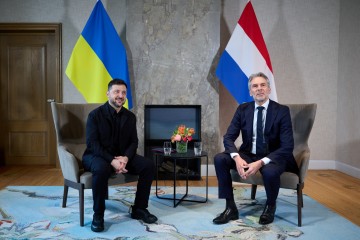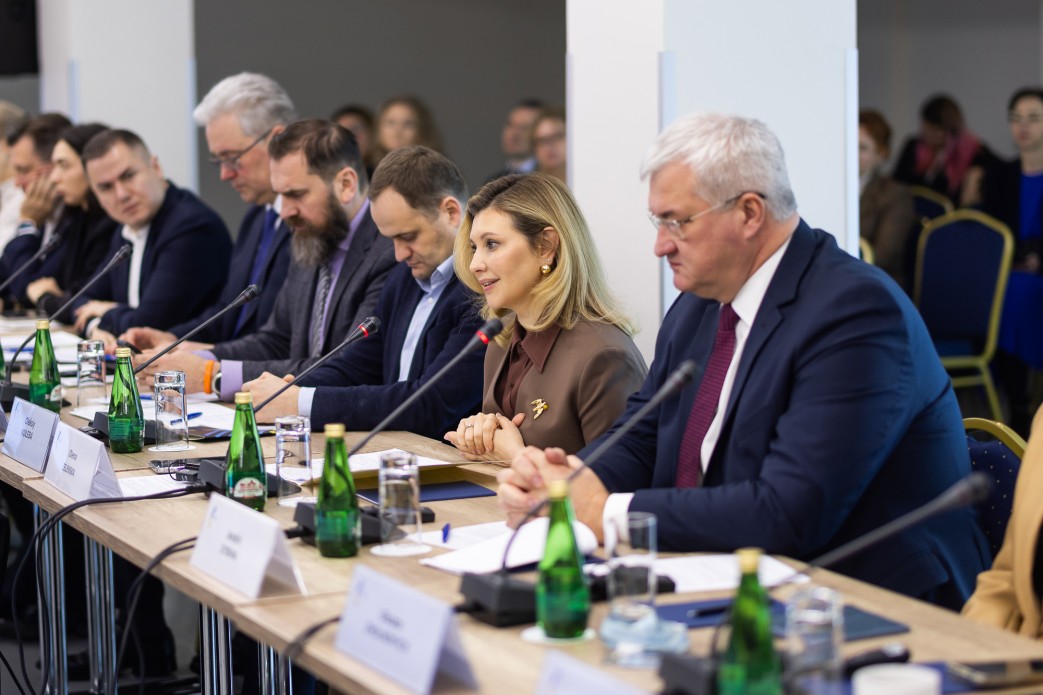First Lady of Ukraine Olena Zelenska took part in a meeting of the Council for Human Rights, Gender Equality and Diversity at the Ministry of Foreign Affairs on the topic "Ukraine and the Biarritz Partnership. Achievements and Prospects."
 The event was attended by Minister of Foreign Affairs Andrii Sybiha, as well as representatives of state authorities, civil society and international partners.
The event was attended by Minister of Foreign Affairs Andrii Sybiha, as well as representatives of state authorities, civil society and international partners.
Representatives of the central executive authorities presented the key annual achievements for each of the five commitments that Ukraine has undertaken as a member of the Biarritz Partnership.
1. Development of inclusive and gender-sensitive public spaces, friendly to families with children and persons with reduced mobility
Last year, as part of its annual monitoring, the Ministry for Communities and Territories Development inspected 54,000 social infrastructure facilities, of which 22 % were accessible, 32.1 % were partially accessible, and 45.9 % remained inaccessible.
Currently, the most accessible buildings are administrative service centers, healthcare facilities, and sports infrastructure, while the least accessible are shelters.
 At the same time, an important task for the Ministry is to ensure that all conditions for accessibility are met in new construction, major repairs and reconstruction. To this end, the regulatory framework and state building standards are being updated.
At the same time, an important task for the Ministry is to ensure that all conditions for accessibility are met in new construction, major repairs and reconstruction. To this end, the regulatory framework and state building standards are being updated.
"UNICEF conducted a survey this year: 83% of Ukrainians consider accessibility a new value for our society. This is a very high percentage. However, public opinion is clearly ahead of accessibility itself. So, there is still a lot to be done," the First Lady emphasized.
2. Ensuring the mainstreaming of gender equality principles in education
At the end of 2022, the Government adopted the Strategy for the Implementation of Gender Equality in Education until 2030. Since then, all educational content has been subject to anti-discrimination expertise.
The Action Plan for 2025-2027 provides for the launch of a special algorithm to help educational institutions implement gender equality policies, introduce comprehensive sexuality education, and support STEM (science, technology, engineering, and mathematics) education with the active participation of girls and women.
 “According to a study conducted last year, textbooks from the school curriculum continue to promote various gender stereotypes. Therefore, it is important to overcome the gender gap at the stage of curricula, and I hope that the Ministry of Education and Science will make it happen,” Olena Zelenska said.
“According to a study conducted last year, textbooks from the school curriculum continue to promote various gender stereotypes. Therefore, it is important to overcome the gender gap at the stage of curricula, and I hope that the Ministry of Education and Science will make it happen,” Olena Zelenska said.
3. Preventing domestic and gender-based violence
This year, a law was passed that provides support with interim reparations for victims of sexual violence committed as a result of Russian armed aggression.
“We know how stigmatized this particular trauma is. Therefore, this is not about money. It is about restoring a sense of justice for the victims - women, men, children - a sense that they are not forgotten, that society respects them and helps them start a new life,” the First Lady emphasized.
On December 19, amendments to the Code of Administrative Offenses will take effect. They include increased responsibility for domestic violence, recognition of children as victims if they have witnessed violence, and a clear distinction between domestic violence and gender-based violence.
 The Ministry of Social Policy is developing special support services and improving professional qualifications. More than 66,000 victims received assistance in the first nine months of this year.
The Ministry of Social Policy is developing special support services and improving professional qualifications. More than 66,000 victims received assistance in the first nine months of this year.
4. Reducing the gender pay gap
The National Strategy for Closing the Gender Pay Gap by 2030 aims to reduce the gender pay gap from 18.6% to 13.6%, which is the average for EU countries.
This year, the Ministry of Economy developed a new Labor Code. It provides for an increase in the number of types of employment contracts, enshrines the right of women and men to equal pay for similar or equivalent work, and ensures the equal right of each parent to parental leave.
“The issue of labor for women is not only a matter of workplaces, but also of infrastructure: kindergartens, schools for children, healthcare for families, and shelters in case of bombing. I am already calling on international partners to help rebuild what the Russians have destroyed. Because infrastructure directly affects women's ability to work and earn money,” Olena Zelenska noted.
5. Reform of the legislation on social leave for childbirth and childcare
This year, the “Municipal Nanny” service, which covers childcare costs for certain categories of parents, was significantly modified and expanded. In particular, the cost of the service for one child was increased and nannies were allowed to care for three children.
The Ministry of Social Policy has also begun to introduce a standard for social support services in communities for students with special educational needs.
 “We are waiting for the Ministry of Economy to submit to Parliament an updated Labor Code that will remove a number of restrictions on working mothers and change the conditions of parental leave. If Ukrainian women know for sure that the community has not only jobs but also other conditions for them, they will have a greater incentive to return from forced emigration. I have repeatedly heard this from our women abroad,” the President's wife said.
“We are waiting for the Ministry of Economy to submit to Parliament an updated Labor Code that will remove a number of restrictions on working mothers and change the conditions of parental leave. If Ukrainian women know for sure that the community has not only jobs but also other conditions for them, they will have a greater incentive to return from forced emigration. I have repeatedly heard this from our women abroad,” the President's wife said.
The First Lady stressed that 2025 should be the year of the Biarritz Partnership in Ukraine.
“When it comes to equal opportunities, there are no specialized or non-specialized ministries. All are specialized, all are responsible. Because this is not just an “international obligation”. This is not for ratings. This is our duty to Ukrainians, to ourselves, so that everyone can live more easily, and preferably right now,” she concluded.




